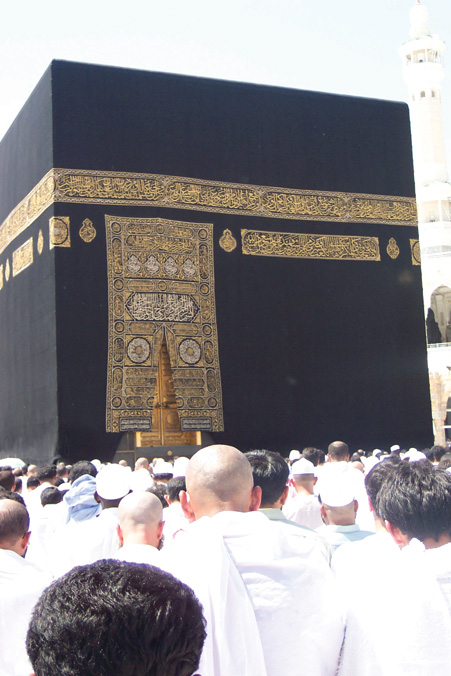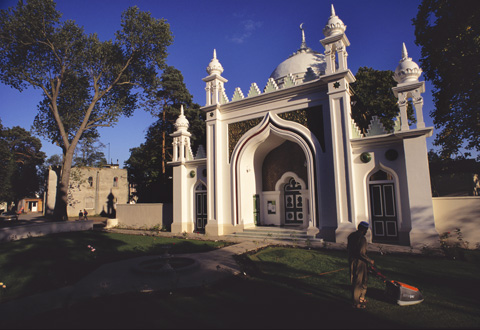What is Allah?
Allah is the name for God in Arabic. Allah is also known by his attributes, like The Compassionate, the Merciful, the Loving. Although we use the English pronoun ‘He’ to refer to God, in Islam and in the Arabic language, Allah is a neutral term.
How did Islam originate?
In seventh century Arabia, when society was gripped by idolatry, the divide between rich and poor was growing, and the Arab tribal system was thriving, Muhammad received a revelation that would transform society both within the Arabian peninsula and significantly in other parts of the world. Christianity and Judaism also originated in the Middle East, and the Prophet made clear that far from bringing a new message, he was in fact calling people back to the one true God and to the way of life people had left. The revelations he received corrected distortions that had crept into earlier revelation and called all to return to the ‘Straight Path’ of Islam.
What are the five pillars of Islam?
Belief in one God, Prayer, Alms, Fasting, and Pilgrimage. These form the foundation of faith for every Muslim.
- The basic declaration of belief, or Shahada is, "There is no God but Allah, and Muhammad is his messenger." Declaring this is all that is required of a person who wishes to embrace Islam.
- Prayer, or Salah is the performing of the five daily prayers, at dawn, noon, mid-afternoon, sundown, and nightfall.
- Alms, or Zakah, is obligatory on every Muslim as a tax to benefit the poor and needy. Every adult Muslim must contribute a 2.5% of his or her wealth (not income) each year.
- Fasting, or Sawm which takes place in the month of Ramadan, involves self discipline and humility through abstention from food, drink and sex from dawn to sunset. It encourages a sense of empathy with those who go hungry around the world and to give charity. It is a time to focus on spiritual nourishment and refinement of character. It ends with the celebration of Eid-ul Fitr.
- Pilgrimage, or Hajj, is to be performed once in a Muslim’s lifetime to the first House of God, the Kabah in Mecca, Saudi Arabia. Pilgrims dress simply in white garments to symbolise the equality of humankind. At least two million Muslims go to perform Hajj in the final month of the Islamic calendar each year. The end of Hajj is marked by the second of two major Muslim festivals, Eid-ul Adha.
What is the Quran?

The Quran, Arabic for ‘recitation’ or ‘reading’, is the scripture of Muslims. They believe that the word of God was revealed through the Angel Gabriel over a period of twenty three years to Muhammad, who died illiterate. He neither authored nor edited the Quran, Muslims believe it is the eternal, literal word of God, preserved and collated in a divinely commanded order.
The Quran was written down during the Prophet’s lifetime in the seventh century by twenty nine scribes who would record the revelations on palm rasps and animal skin. Many of the Prophet’s companions would memorise the entire Quran with the Prophet.
The 114 chapters of the Quran speak of the majesty of God, His creation of mankind and life, of the Life Hereafter and the stories of Prophets. The Quran calls for social and religious reform, and places great emphasis on social justice – the rights of women, orphans, the equality of humankind, and moral and ethical principles to govern all aspects of life.
What are Hadith?
Hadiths are a collection of sayings and actions by the Prophet Muhammad, which were well documented verbal reports by his companions. There are thousands of hadiths from which have been derived the Sunnah, or the Prophet’s way of life. They cover all aspects of living: how to be a good neighbour, how to refrain from slander, how to mourn and even how to maintain personal hygiene. Muslims seek to emulate the Prophetic example in their daily lives as much as possible.
What is the Kabah?
 This building is the most sacred space in the Muslim world. It sits in Mecca, Saudi Arabia and is considered the first house built for the worship of the one God. First built by Adam, the first man and prophet, it was destroyed by floods, but later rebuilt by Abraham and his son Ishmael. By the time of the Prophet Muhammad, it has fallen under pagan Arab rule and used as a shrine for their 360 idols. Muhammad restored the Kabah to its original worship of one God.
This building is the most sacred space in the Muslim world. It sits in Mecca, Saudi Arabia and is considered the first house built for the worship of the one God. First built by Adam, the first man and prophet, it was destroyed by floods, but later rebuilt by Abraham and his son Ishmael. By the time of the Prophet Muhammad, it has fallen under pagan Arab rule and used as a shrine for their 360 idols. Muhammad restored the Kabah to its original worship of one God.
How is Islam similar to Christianity and Judaism?
Islam, Christianity and Judaism are all monotheistic faiths worshipping one God. All share common beliefs in prophets and divine revelation. All stress moral rights and responsibilities, and accountability on the Day of Judgment leading to reward or punishment in the afterlife. Each faith emphasises its covenant with God, through Moses for Judaism, Jesus for Christianity and Muhammad for Islam. Islam recognises the validity of Judaism and Christianity and expresses respect for the prophets mentioned in their Scriptures as they are also mentioned in the Quran. Muslims believe in Moses, and Jesus, but they do not believe Jesus as the son of God, rather he was a Prophet born in a miracle birth to Mary. The Quran even mentions the Virgin Mary more often than the Bible, demonstrating the high-regard that Judeo-Christian figures have in Islam.
Muslims see the message of Islam as superseding all earlier revelations. They believe the Quran is the complete word of God and that Muhammad is the final Messenger and seal of the prophets. While Muslims respect much of the Torah, the Gospel and the Psalms, they believe that they have been changed by man over the centuries.
What does Islam say about violence?
The value of life is sacred in Islam, to violate it goes categorically against its principles. The Quran states “If anyone murders an (innocent) person, it will be as if he has murdered the whole of humanity. And if anyone saves a person it will be as if he has saved the whole of humanity” [5:32]. It is not permitted for Muslims to kill or oppress another. The Quran says, ‘Help one another in benevolence and piety, and help not one another in sin and transgression’ [5:2] “Allah loves not the aggressors” [2:190].
What is Jihad?
Often mistranslated as ‘holy war’ jihad is an all encompassing terms that literally means ‘to strive, or struggle’. Within Islam, its context is to strive in the path of God as exemplified by the Prophet Muhammad and his companions. Jihad pertains to the difficulty and complexity of leading a good life, struggling against the evil in oneself and to become virtuous and moral, to perform good actions and to contribute to the betterment of society. It is distressing that today a violent minority have abused the word jihad and have thus distorted its true meaning.
What is the meaning of life in Islam?
Life is a sacred trust from God and a human is a trustee who should handle the trust with honesty and skill, and with mindfulness of God. When God gives life He endows the human being with unique qualities and abilities, and charges the human with certain obligations. God means to help humankind fulfil the purpose of life and realise the goal of existence: to seek the pleasure of God in order to have eternal pleasure in the afterlife.
"Live in this world as if you are a traveller or a wayfarer" is a saying of the Prophet Muhammad. Life may be likened to a journey starting from a certain point and ending at a certain destination. It is a transitory stage, an introduction to the eternal life in the Hereafter. According to Islamic teaching, the best use of life is to live it according to the guidance of God and perform good deeds in order to ensure a place in Paradise. As life is a means to an ultimate end, Islam has laid down a comprehensive system of principles and regulations on how to lead it. Muslims believe that we all belong to God and to Him is our final return. Life, therefore, is a complete circle and death is a doorway that leads to the true eternal existence.
According to Islamic teaching, the best use of life is to live it according to the guidance of God and perform good deeds in order to ensure a place in Paradise. As life is a means to an ultimate end, Islam has laid down a comprehensive system of principles and regulations on how to lead it. Muslims believe that we all belong to God and to Him is our final return. Life, therefore, is a complete circle and death is a doorway that leads to the true eternal existence.
What is the status of women in Islam?
The Quran states that men and women were created to be equal parts of a pair [51:49] and that their relationship is one of love and mercy such that they are like garments to one another. The revelation of the Quran elevated the status of women throughout society via numerous means: abolishing the status of women as property, allowing them to retain their maiden name after marriage, furnishing them the right to vote – thirteen centuries before women attained the right to vote in the UK, and the right to inheritance and owning property and businesses.
In Islam, education, social and political participation is a duty on both women and men. Early Islamic history saw the rise of Muslim women as scholars, politicians, businesswomen, jurists and doctors at a time when Europe still regarded women as a commodity.
Some verses of the Quran have been quoted to suggest gender discrimination, but there is a clear distinction to be drawn between verses that respond to specific social and cultural contexts and those that represent universal principles. A common area of confusion is the stipulation regarding polygamy, which actually restricted the practice rather than encouraging it at a time when Arabs in seventh century society married many women and being monogamous was not the norm, "if you will not be able to deal justly [with them, marry] only one" [4:3]. It may be noted here that today more than 99% of Muslim marriages are monogamous, polygamy being the exception rather than the rule.
What is hijab?
 Hijab is another source of interest and has been victim to much criticism and debate. Modesty in Islam is something that is stressed for both sexes, "Tell the believing men to lower their gaze and guard their modesty, and say to the believing women to lower their gaze and guard their modesty" [24:30–31]. Hijab literally means ‘veil’, ‘covering’ or, barrier’, while the Arabic word ‘khimar’ refers to the head scarf, however hijab has come to take on the meaning of a Muslim woman’s head-dress. Hijab symbolises many things: religious devotion, discipline, respect, identity and modesty. It is viewed by many Muslim women as another part of their ‘ibadah’ or worship of God since worship in Islam can be seen in a holistic sense, for example, giving charity or helping a neighbour is also seen as acts of worship.
Hijab is another source of interest and has been victim to much criticism and debate. Modesty in Islam is something that is stressed for both sexes, "Tell the believing men to lower their gaze and guard their modesty, and say to the believing women to lower their gaze and guard their modesty" [24:30–31]. Hijab literally means ‘veil’, ‘covering’ or, barrier’, while the Arabic word ‘khimar’ refers to the head scarf, however hijab has come to take on the meaning of a Muslim woman’s head-dress. Hijab symbolises many things: religious devotion, discipline, respect, identity and modesty. It is viewed by many Muslim women as another part of their ‘ibadah’ or worship of God since worship in Islam can be seen in a holistic sense, for example, giving charity or helping a neighbour is also seen as acts of worship.
What is Shariah?
Shariah covers all laws and governance pertaining to a Muslim’s life. The Arabic word literally refers to a waterway that leads to a main water source. Just as following all laws and principles set out by Islam, Muslims ultimately submit to the will of God, the source of life. Shariah is a framework that governs interactions between the individual and God, and between human beings. Both have public and private dimensions and both give Islam a prominent role on Muslim community life. Shariah is only applied to Muslims and not to people of other faiths and beliefs.
Does Islam promote race equality?
The Islamic civilisation nurtured genuine social equality irrespective of colour or race. During his final sermon, Prophet Muhammad said, All men are from Adam, and Adam is from clay. There is no superiority of an Arab over a non-Arab, nor a white person over a black person except in God-consciousness. These principles were implemented throughout daily life: in the mosques people of all colours and races met to pray shoulder to shoulder, they worked together in government and academia.
Among the closest companions of the Prophet was the former Abyssinian slave, Bilal who became the first man to call people to prayer, the first muezzin. Prophet Muhammad had ordered him to scale the Kabah on the day of the peaceful conquest of Mecca to call people to prayer. That this man could stand with the divine sanctuary under his feet was a declaration that piety transcends all things and it sent a powerful message to all that racism has no place in Islam.
How did Islam contribute to the field of medicine?
 Medical science made extraordinary progress during the Islamic civilisation and formed much of the basis of western healthcare today. Muslim experts pioneered in all areas of medicine including surgery, anatomy, ophthalmology, pharmacology, and physiology. The great Translation movement which began in the ninth century initiated under the Caliph Mamun in Baghdad, led to thousands of Greek works by Aristotle, Plato, Hippocrates, Ptolemy and Galen being translated into Arabic, and this knowledge was later transferred to Europe. Medical texts were not only translated, but their concepts and methods were further developed by the Muslims who pioneered in medical progress. Ibn Sina who was born in the tenth century, known as Avicenna in Europe, became renowned for his magnum opus, the cannon of Medicine – an encyclopaedia covering all aspects of medical practice which was used in the universities of Montpellier and Louvain as late as the seventeenth century. The thirteenth century medic Ibn Nafis discovered pulmonary circulation in contradiction to Galen’s view that blood was continually being made and used up, nearly four centuries before William Harvey announced his discovery that blood circulated around the body in 1616.
Medical science made extraordinary progress during the Islamic civilisation and formed much of the basis of western healthcare today. Muslim experts pioneered in all areas of medicine including surgery, anatomy, ophthalmology, pharmacology, and physiology. The great Translation movement which began in the ninth century initiated under the Caliph Mamun in Baghdad, led to thousands of Greek works by Aristotle, Plato, Hippocrates, Ptolemy and Galen being translated into Arabic, and this knowledge was later transferred to Europe. Medical texts were not only translated, but their concepts and methods were further developed by the Muslims who pioneered in medical progress. Ibn Sina who was born in the tenth century, known as Avicenna in Europe, became renowned for his magnum opus, the cannon of Medicine – an encyclopaedia covering all aspects of medical practice which was used in the universities of Montpellier and Louvain as late as the seventeenth century. The thirteenth century medic Ibn Nafis discovered pulmonary circulation in contradiction to Galen’s view that blood was continually being made and used up, nearly four centuries before William Harvey announced his discovery that blood circulated around the body in 1616.
What is the relationship between science and Islam?
Scientific discovery and learning flourished under Islamic civilisations for centuries. The remarkable leap in science between the eighth and twelfth centuries was known as the Golden Age of Islam. Today many words from the Arabic language enter the sciences, words like alchemy, algebra, algorithm and alkali. Muslims pioneered in fields of astronomy, mathematics, physics. Muslim astronomers established large observatories and produced highly sophisticated and accurate devices such as the astrolabe which was used in navigation through celestial calculation.
Quranic verses allude to scientific phenomena, like the cosmology: "And He it is Who created the night and the day, and the sun and the moon. They float, each in an orbit. ‘(God is) the one who created the night, the day, the sun and the moon. Each one is travelling in an orbit with its own motion" [21: 33], and to embryology: "We created you out of dust, then out of sperm, then out of a leech-like clot, then out of a morsel of flesh, partly formed and partly unformed" [22:5].
Islam is not at odds with science that has been soundly established, and it is clear that the sciences have enjoyed a thriving development under the Islamic ethos enjoining the pursuit of knowledge and learning.


No comments:
Post a Comment